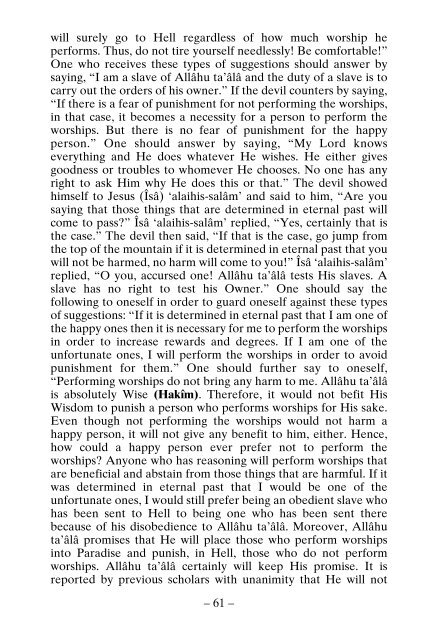Ethics of Islam
Ethics of Islam is taken from the book Berîka by Muhammad Hâdimi. Immorality and ways to get rid of it; 40 depravities and cures to them; usefulness of ethics; what is a soul; strengths of a soul; Personalities emanating from wisdom, courage, chastity and justice are extensively explained.
Ethics of Islam is taken from the book Berîka by Muhammad Hâdimi. Immorality and ways to get rid of it; 40 depravities and cures to them; usefulness of ethics; what is a soul; strengths of a soul; Personalities emanating from wisdom, courage, chastity and justice are extensively explained.
You also want an ePaper? Increase the reach of your titles
YUMPU automatically turns print PDFs into web optimized ePapers that Google loves.
will surely go to Hell regardless <strong>of</strong> how much worship he<br />
performs. Thus, do not tire yourself needlessly! Be comfortable!”<br />
One who receives these types <strong>of</strong> suggestions should answer by<br />
saying, “I am a slave <strong>of</strong> Allâhu ta’âlâ and the duty <strong>of</strong> a slave is to<br />
carry out the orders <strong>of</strong> his owner.” If the devil counters by saying,<br />
“If there is a fear <strong>of</strong> punishment for not performing the worships,<br />
in that case, it becomes a necessity for a person to perform the<br />
worships. But there is no fear <strong>of</strong> punishment for the happy<br />
person.” One should answer by saying, “My Lord knows<br />
everything and He does whatever He wishes. He either gives<br />
goodness or troubles to whomever He chooses. No one has any<br />
right to ask Him why He does this or that.” The devil showed<br />
himself to Jesus (Îsâ) ‘alaihis-salâm’ and said to him, “Are you<br />
saying that those things that are determined in eternal past will<br />
come to pass?” Îsâ ‘alaihis-salâm’ replied, “Yes, certainly that is<br />
the case.” The devil then said, “If that is the case, go jump from<br />
the top <strong>of</strong> the mountain if it is determined in eternal past that you<br />
will not be harmed, no harm will come to you!” Îsâ ‘alaihis-salâm’<br />
replied, “O you, accursed one! Allâhu ta’âlâ tests His slaves. A<br />
slave has no right to test his Owner.” One should say the<br />
following to oneself in order to guard oneself against these types<br />
<strong>of</strong> suggestions: “If it is determined in eternal past that I am one <strong>of</strong><br />
the happy ones then it is necessary for me to perform the worships<br />
in order to increase rewards and degrees. If I am one <strong>of</strong> the<br />
unfortunate ones, I will perform the worships in order to avoid<br />
punishment for them.” One should further say to oneself,<br />
“Performing worships do not bring any harm to me. Allâhu ta’âlâ<br />
is absolutely Wise (Hakîm). Therefore, it would not befit His<br />
Wisdom to punish a person who performs worships for His sake.<br />
Even though not performing the worships would not harm a<br />
happy person, it will not give any benefit to him, either. Hence,<br />
how could a happy person ever prefer not to perform the<br />
worships? Anyone who has reasoning will perform worships that<br />
are beneficial and abstain from those things that are harmful. If it<br />
was determined in eternal past that I would be one <strong>of</strong> the<br />
unfortunate ones, I would still prefer being an obedient slave who<br />
has been sent to Hell to being one who has been sent there<br />
because <strong>of</strong> his disobedience to Allâhu ta’âlâ. Moreover, Allâhu<br />
ta’âlâ promises that He will place those who perform worships<br />
into Paradise and punish, in Hell, those who do not perform<br />
worships. Allâhu ta’âlâ certainly will keep His promise. It is<br />
reported by previous scholars with unanimity that He will not<br />
– 61 –

















